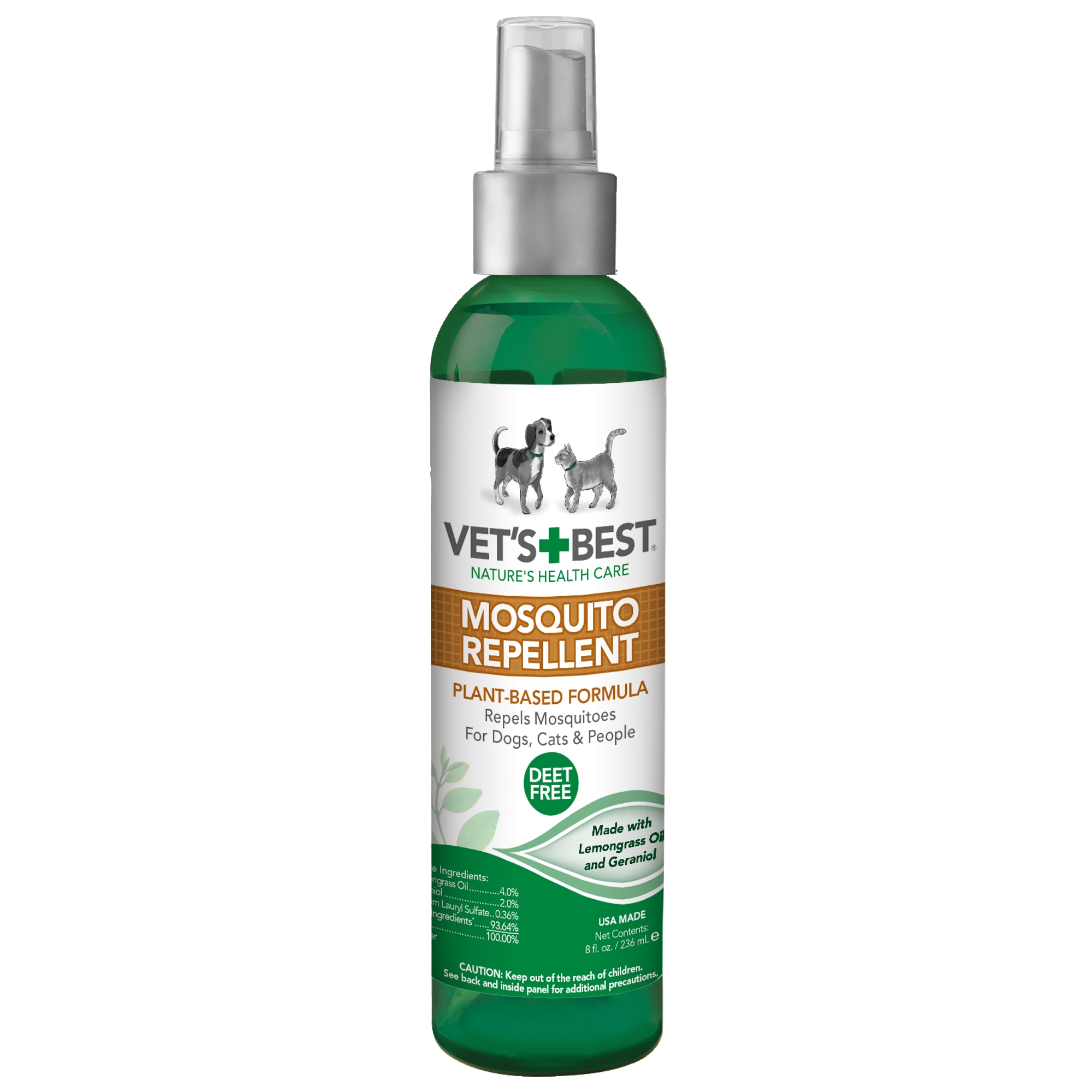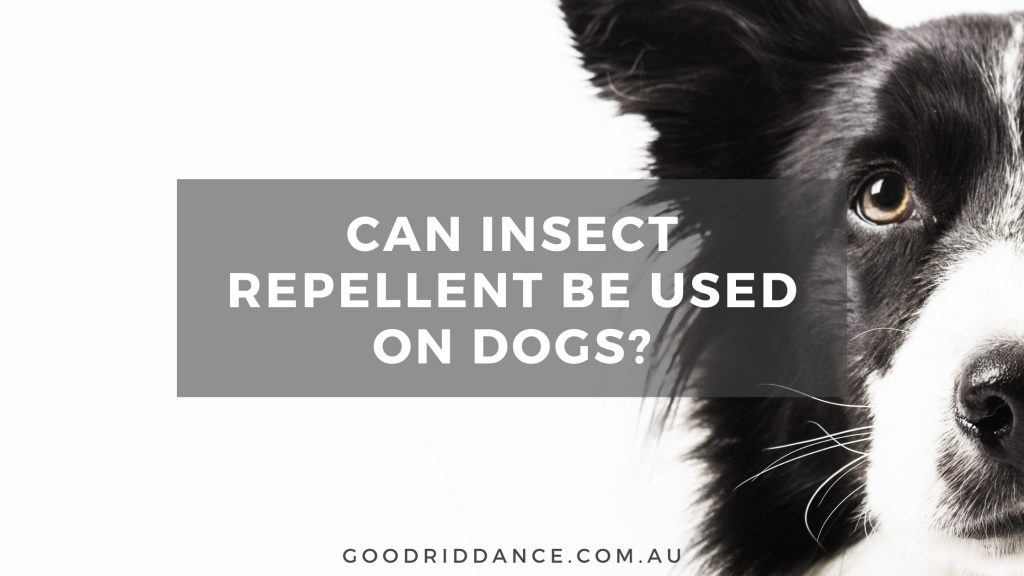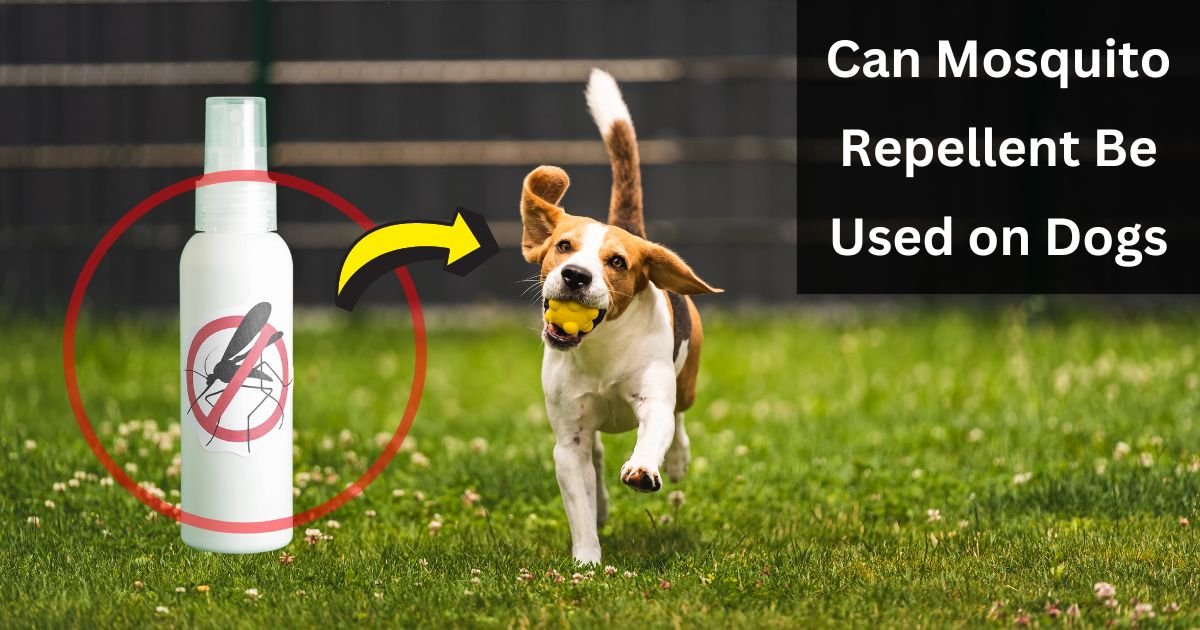No, human mosquito repellent should never be used on dogs due to harmful ingredients like DEET and Picaridin. These can cause adverse reactions like vomiting and seizures in dogs.
It is important to use pet-safe mosquito repellents specifically designed for dogs to ensure their safety and well-being. Protecting your furry friend from mosquito bites is crucial, and using products formulated for dogs is the safest way to repel insects effectively without risking their health.
By choosing the right mosquito repellent for your dog, you can enjoy outdoor activities together while keeping them safe and comfortable. Remember, your dog’s health is a top priority, so always opt for products that are specifically made for canine use to prevent any potential harm.

Credit: www.petco.com
The Risks Of Human Mosquito Repellents For Dogs
When it comes to protecting our furry friends from pesky mosquitoes, it’s important to be cautious about the products we use. While human mosquito repellents may seem like a convenient solution, they can pose serious risks to dogs. It’s crucial to understand the potential dangers associated with using human repellents on dogs, including toxic ingredients and the symptoms of repellent toxicity in canines.
Toxic Ingredients In Human Repellents
Human mosquito repellents often contain ingredients like DEET and Picaridin, which can be harmful to dogs if ingested or absorbed through their skin. These chemicals can lead to symptoms such as vomiting, staggering, irritation, and even seizures in dogs. To ensure the safety of your pet, it’s essential to avoid using repellents designed for human use on dogs.
Symptoms Of Repellent Toxicity In Canines
Recognizing the signs of repellent toxicity in dogs is crucial for prompt intervention. If a dog has been exposed to human mosquito repellents, symptoms such as excessive drooling, vomiting, tremors, and seizures may occur. Immediate veterinary attention is necessary if any of these symptoms are observed after potential repellent exposure.
Understanding Deet And Its Dangers
Using mosquito repellent designed for humans on dogs can be dangerous, as it often contains harmful ingredients like DEET and Picaridin, which can lead to vomiting, staggering, and seizures in pets. It’s best to avoid using human insect repellent on dogs and opt for pet-safe alternatives available at your local pet supply store.
Understanding DEET and Its Dangers Neurological Risks Associated with DEET DEET, or N,N-Diethyl-meta-toluamide, is a common ingredient found in many insect repellents for humans. While it is effective in repelling mosquitoes and other insects, it can be dangerous for our furry friends.
Dogs are particularly sensitive to DEET and can experience neurological risks when exposed to it. DEET can cause neurological problems in dogs, including tremors, seizures, and even death. These risks are especially high if the dog ingests or licks the repellent off their skin.
Therefore, it is crucial to keep your dog away from any areas where DEET has been applied and to avoid using human mosquito repellent on your canine companion. Alternatives to DEET for Dogs Fortunately, there are alternatives to DEET that can effectively repel mosquitoes and other pests without posing a risk to your dog’s health.
Here are some safe and effective options:
1. Natural Repellents: Look for insect repellents specifically formulated for dogs that use natural ingredients like lemongrass oil or citronella. These are safe and gentle on your dog’s skin while still being effective in keeping pesky mosquitoes at bay.
2. Neem Oil: Neem oil is derived from the neem tree and has natural insect-repelling properties. It can be diluted and applied to your dog’s fur to repel mosquitoes and other insects.
3. Essential Oils: Certain essential oils, such as lavender, eucalyptus, and peppermint, have insect-repelling properties.
However, it is important to note that essential oils should always be diluted before applying to your dog’s skin, as they can be irritating in their pure form. When choosing an alternative to DEET for your dog, always consult with your veterinarian to ensure the product is safe and suitable for your furry friend.
Additionally, it’s important to follow the manufacturer’s instructions and avoid over-applying the repellent, as excessive use can still cause skin irritation. In conclusion, while DEET may be effective in repelling mosquitoes for humans, it should never be used on dogs due to the potential neurological risks it poses.
Instead, opt for safer alternatives that are specifically formulated for dogs and consult with your veterinarian for guidance on the best repellent options for your furry friend’s specific needs. By prioritizing your dog’s safety and well-being, you can keep them protected from mosquitoes without compromising their health.
Picaridin: Is It Safer Than Deet For Dogs?
Picaridin, a safer alternative to DEET, can be used on dogs as a mosquito repellent. Avoid using human insect repellents on dogs, as DEET and Picaridin can be harmful, causing vomiting, irritation, and seizures in pets. Opt for pet-safe mosquito repellent products to protect your furry friend.
Comparing Picaridin And Deet Toxicity
When it comes to choosing a mosquito repellent for your furry friend, it’s important to consider the potential toxicity of the ingredients. DEET and Picaridin are two of the most commonly used insect repellents, but they can both be harmful to dogs if ingested or absorbed through the skin. However, Picaridin is considered to be safer than DEET because it is less toxic and has fewer reported side effects. It is also less likely to cause skin irritation or sensitivity in dogs.
Picaridin’s Effects On Canine Health
While Picaridin is generally considered to be safe for use on dogs, it’s still important to be cautious and follow the manufacturer’s instructions. Some dogs may be more sensitive to the ingredient than others, and excessive use can cause skin irritation or allergic reactions. It’s also important to avoid applying Picaridin near your dog’s eyes, mouth, or genitals, and to avoid letting them lick the product off their fur. If you notice any signs of discomfort or adverse reactions after using Picaridin on your dog, stop use immediately and consult with your veterinarian.

Credit: goodriddance.com.au
Natural Repellent Ingredients And Their Efficacy
It is not safe to use human mosquito repellent on dogs, as it can cause harmful side effects such as vomiting and seizures. Instead, there are pet-safe mosquito repellent products available at your local pet supply store, or you can try using natural ingredients such as lemongrass oil to repel mosquitoes on your dog.
However, it is important to avoid using citronella, which can be toxic to dogs and cats.
Natural Repellent Ingredients and Their Efficacy When it comes to protecting your furry friend from pesky mosquitoes, you may be wondering if mosquito repellent can be used on dogs.
While it’s important to note that not all mosquito repellents are safe for dogs, there are natural ingredients that can be effective in repelling mosquitoes without putting your pet at risk.
Lemongrass Oil: A Dual-Purpose Repellent Lemongrass oil is a natural mosquito repellent that is safe for dogs and humans alike. This essential oil has been found to be effective in repelling mosquitoes, as well as fleas and ticks. In fact, a study conducted by the Department of Agriculture found that lemongrass oil was able to repel mosquitoes for up to 2.5 hours.
Simply mix a few drops of lemongrass oil with a carrier oil, such as coconut oil, and apply it to your dog’s fur. Vinegar as a Mosquito Repellent for Pets Another natural ingredient that can be effective in repelling mosquitoes is vinegar.
Simply mix equal parts water and apple cider vinegar in a spray bottle and apply it to your dog’s fur. Not only will this help to repel mosquitoes, but it can also be effective in repelling fleas and ticks. When it comes to protecting your dog from mosquitoes, it’s important to use safe and natural ingredients.
By using lemongrass oil or vinegar, you can help to keep your dog protected without putting them at risk. So the next time you’re spending time outdoors with your furry friend, consider using a natural mosquito repellent to keep them safe and comfortable.
Yard Treatments And Pet Safety
When it comes to mosquito repellent for dogs, it’s essential to consider the safety of your furry friends, especially when using yard treatments. Here, we discuss precautions to take during mosquito yard sprays and explore pet-safe yard treatment options.
Precautions During Mosquito Yard Sprays
- Keep pets inside during yard treatments.
- Avoid letting pets near treated areas until dry.
- Consult with your veterinarian for advice.
Pet-safe Yard Treatment Options
- Opt for natural repellents like citronella or neem oil.
- Consider mosquito-repelling plants for your yard.
- Use pet-friendly mosquito sprays recommended by vets.
Commercial Pet-safe Mosquito Repellents
When it comes to protecting your furry friend from pesky mosquitoes, it’s essential to choose a pet-safe mosquito repellent. However, with a multitude of products on the market, it can be overwhelming to select the right one for your dog. Here’s a guide to help you make an informed decision.
Choosing The Right Product For Your Dog
When choosing a mosquito repellent for your dog, opt for products specifically formulated for pets. Look for repellents that are labeled as safe for dogs and avoid those containing DEET, Picaridin, or other potentially harmful chemicals.
Understanding Labels And Ingredients
Before purchasing a mosquito repellent, carefully read the product labels and familiarize yourself with the ingredients. Seek natural options with plant-based ingredients such as citronella, lemongrass, or cedarwood, as they are generally safer for pets.
Diy Mosquito Repellents For Dogs
Dogs can benefit from natural mosquito repellents. Here are some homemade recipes and tips:
Home Recipes For Canine Repellents
- Apple Cider Vinegar Spray: Mix equal parts water and apple cider vinegar in a spray bottle.
- Neem Oil Solution: Dilute neem oil with water and a few drops of mild soap.
- Lemon Eucalyptus Spray: Combine water with lemon eucalyptus essential oil for a fragrant repellent.
Essential Oils: Benefits And Risks
Essential oils like lavender and peppermint can repel mosquitoes, but use caution:
- Benefits: Natural, pleasant scent, and effective repellent properties.
- Risks: Some oils can be toxic to dogs if ingested or applied in high concentrations.
Always consult a vet before using essential oils on your dog.

Credit: www.petco.com
Preventing Mosquito Bites Beyond Repellents
It is not safe to use human mosquito repellent on dogs as the ingredients such as DEET and Picaridin can cause harm to their health. Instead, pet-safe mosquito repellent products can be found at local pet supply stores. Additionally, lemongrass oil is a natural insect repellent that can be used on dogs.
Environmental Controls For Mosquito Management
Maintaining a clean yard by eliminating standing water helps reduce mosquito breeding.
Protective Clothing And Accessories For Dogs
Dress your dog in light-colored clothing and use mosquito-proof accessories like repellent collars.
Frequently Asked Questions
Can You Use Human Mosquito Repellent On Dogs?
No, you should not use human mosquito repellent on dogs. DEET and Picaridin, common ingredients in human repellents, can be harmful to dogs and cause vomiting, staggering, irritation, and seizures. It’s important to use repellents specifically designed for dogs to protect them from mosquitoes.
What Can I Put On My Dog To Repel Mosquitoes?
Use pet-safe mosquito repellents containing natural ingredients like lemongrass oil to repel mosquitoes from your dog. Avoid using human insect repellents, as they can be harmful to pets. Keep your pets inside when spraying the yard for mosquitoes. Avoid using citronella, which can be toxic to dogs and cats.
Is Spraying Your Yard For Mosquitoes Safe For Dogs?
No, spraying your yard for mosquitoes is not safe for dogs. Keep pets inside when spraying and avoid letting them lick treated areas. Never use human insect repellent on dogs, as it can cause vomiting, staggering, irritation, and seizures. Opt for pet-safe mosquito repellent products.
Conclusion
It is important to avoid using human mosquito repellent on dogs. The ingredients in these repellents, such as DEET and Picaridin, can be harmful to dogs and may cause vomiting, staggering, irritation, and seizures. Instead, consider using pet-safe mosquito repellent products specifically designed for dogs.
Additionally, natural alternatives like lemongrass oil can be effective in repelling mosquitoes. Remember to prioritize your dog’s safety and consult with a veterinarian for the best options to protect your furry friend from mosquitoes.
Related posts:

I’m MD Tanvir, and I bring years of expertise gained from working closely with pest control companies to the forefront. My journey in the industry has inspired me to launch Bug Battler, a platform aimed at equipping people with the know-how to combat pests autonomously. Through Bug Battler, I aim to empower individuals with practical insights to tackle pest infestations effectively.

